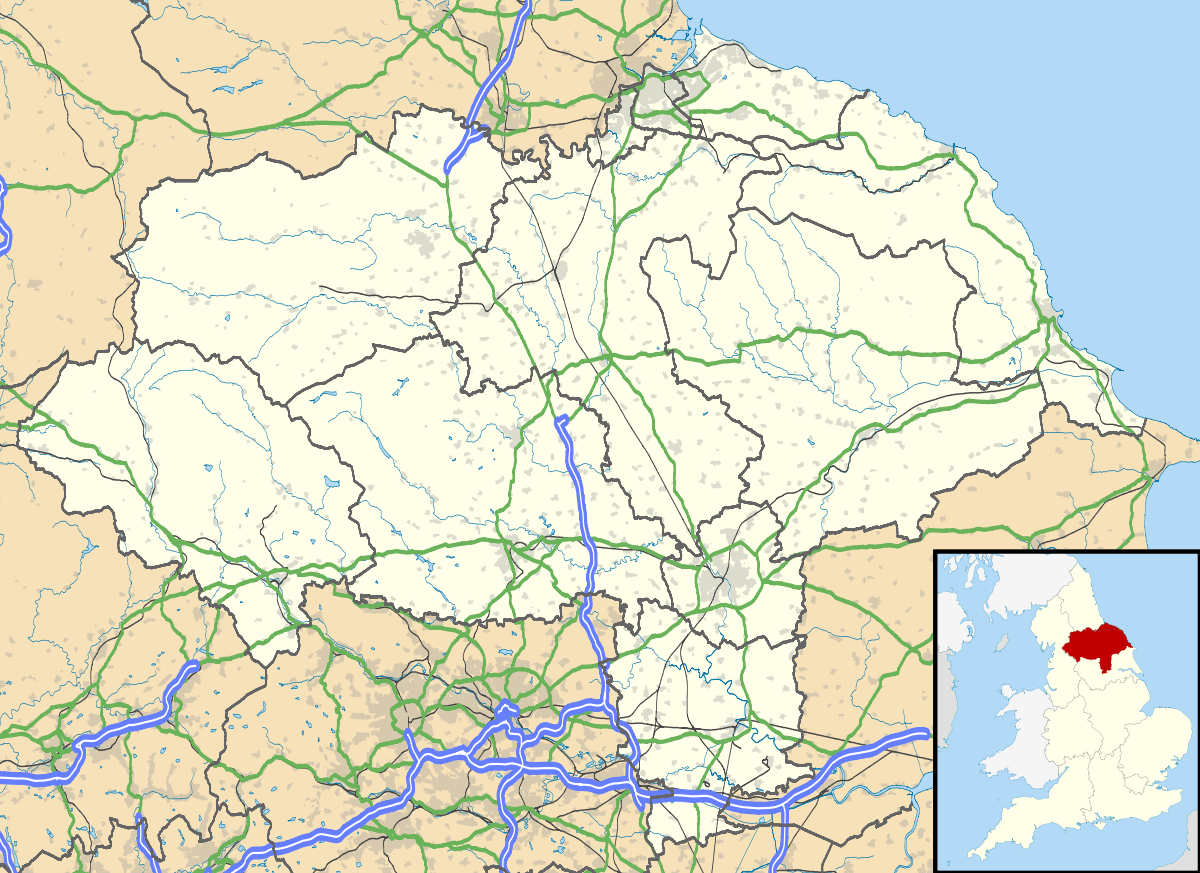Blubberhouses
| Blubberhouses | |
 Blubberhouses |
|
| OS grid reference | SE167553 |
|---|---|
| – London | 180 mi (290 km) SSE |
| Shire county | North Yorkshire |
| Region | Yorkshire and the Humber |
| Country | England |
| Sovereign state | United Kingdom |
| Post town | OTLEY |
| Postcode district | LS21 |
| Police | North Yorkshire |
| Fire | North Yorkshire |
| Ambulance | Yorkshire |
| EU Parliament | Yorkshire and the Humber |
Coordinates: 53°59′37″N 1°44′43″W / 53.99373°N 1.74538°W
Blubberhouses is a small village and civil parish located in the Washburn Valley in the borough of Harrogate in North Yorkshire, a county in the north of England. The population as at the 2011 Census was less than 100. Details are included in the civil parish of Fewston. It is situated to the south of the Yorkshire Dales national park, and to the north of a Roman road and Fewston Reservoir.

The village is on the A59 road from Harrogate to Skipton.
The Anglican village church of St Andrew's (designed by Edward Buckton Lamb), is part of the ecclesiastical parish of Fewston.[1] The village has two cricket teams who play at a ground on the River Washburn.[2]
On 6 July 2014, Stage 2 of the 2014 Tour de France from York to Sheffield, passed through the village. It was also the location of the first climb of the stage, the Category 4 Côte de Blubberhouses, at the 47 kilometres (29 mi) point. It was 1.8 kilometres (1.1 mi) long at an average gradient of 6.1%. The 1 point for the King of the Mountain competition was claimed by Frenchman, Cyril Lemoine of Cofidis.[3]
Etymology
Several suggestions have been made for the origins of the name Blubberhouses:-
- From the blueberry: Ely Hargrove's History of Knaresborough.
- From the Blue Boar, a former inn.
- Early spellings include "Bluburgh", "Bluborrow", "Bluburhouse", (1172) "Bluberhusum". These may come from:-
- Anglo-Saxon burh = "fort".[4]
- From "Blueberg" = "blue mountain".[5]
- Anglo-Saxon bluberhūs = "the house(s) which is/are at the bubbling stream",[6] with a later regularised plural; the -um form came from the Anglo-Saxon dative plural case æt bluberhūsum = "at the houses which ...".
In popular culture
Blubberhouses is used as a key setting for local composer Andy Tillison's composition "Le Sacre Du Travail",[7] a five movement electric sinfonia recorded by the progressive rock ensemble The Tangent. The work is, according to the CD sleeve notes, loosely based around Igor Stravinsky's "Le Sacre Du Printemps" (The Rite Of Spring). One section of the second movement is named "Dawn At Blubberhouses" and the village is mentioned by name in the lyrics/libretto. A short story in the CD sleeve describes the journey of a man travelling to work through the village in the small hours of the morning. The CD album was released in 2013 by the German record label Inside Out Music.
References
- ↑ "Fewston with Blubberhouses: Home". fewstonwithblubberhouses.org.uk. Retrieved 13 April 2014.
- ↑ "Blubberhouses Cricket Club".
- ↑ "Tour de France Stage 1". Retrieved 15 July 2014.
- ↑ Grainge, William (1871). Harrogate and the Forest of Knaresborough.
- ↑ Bradley, Tom (1895). The Washburn.
- ↑ Mills, A.D. Oxford Dictionary of English Place-names. ISBN 0-19-280074-4.
- ↑ Tangent, The. Le Sacre Du Travail. 5052205065525 UPC.
External links
 Media related to Blubberhouses at Wikimedia Commons
Media related to Blubberhouses at Wikimedia Commons- Landslide near Blubberhouses September 2010 British Geological Survey